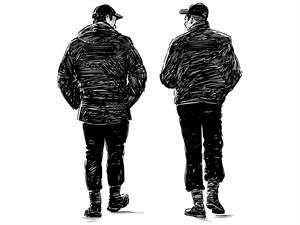PDF chapter test TRY NOW
"The Old-Clock Shop" is a short Christmas story that teaches us the importance of peace and goodwill in people. The entire story takes place during the Eve of Christmas in an old-clock shop run by an old man called Ray.

An old-clock shop
In echoing the true Christmas spirit, the protagonist extends compassion and thoughtfulness to a man with wrong intentions. The act of benevolence stops the man from committing a crime, and it spreads peace, kindness, hope, and positivity around.
The story takes place during the Christmas Eve. Joy and spirit that come with Christmas were spreading everywhere. And so was the snow. Salt Lake City, where the story is taking place, was covered with snow. While it is common to have snow during the Christmas season, snow can also be seen as a metaphor.
Snow is a sign of hope and a new beginning. As Shelly had said, "if winter comes, can spring be far behind?" Yet, it can also symbolise hardships and gloominess.
While winter and snow are aesthetically pleasing, freezing weather can be hard on the poor. They may not have proper shelter to protect themselves from the cold. Hence, snow can be a symbol of beauty and pain.
Moreover, the story describes the snow as ‘a thick, white sheet lying over Salt Lake City’. The snow is thick, and hence it means that it is severe. Moreover, it was lying over the city, as though the city was being hidden from the heaven's eyes. The line suggests that various forms of evil are lurking around, yet humans are all by themselves to deal with it.
Furthermore, it is essential to note that people tend to become more desperate during the festival season. For instance, during Christmas (or any festival for that matter), some celebrate, and some cannot afford a celebration. Imagine how the less fortunate people might feel when they have no means to celebrate? Especially when they see the others celebrating while they cannot give their family a decent meal. These are the times when even the innocent people are pushed into the wrong paths, out of their desperate need to live a normal life.
Back to the story, we see that the day has come to an end, paving the way to the Christmas Eve. People were going back to their homes after their last-minute shopping. Most of the shops were closed for the day. The shopkeepers were also probably rushing back home to be with their family and friends. However, an old-clock shop remained open. Ray, an old deaf man, ran it. The day the story took place, Ray had been working on a clock which he eventually sold.
Snow is a sign of hope and a new beginning. As Shelly had said, "if winter comes, can spring be far behind?" Yet, it can also symbolise hardships and gloominess.
While winter and snow are aesthetically pleasing, freezing weather can be hard on the poor. They may not have proper shelter to protect themselves from the cold. Hence, snow can be a symbol of beauty and pain.
Moreover, the story describes the snow as ‘a thick, white sheet lying over Salt Lake City’. The snow is thick, and hence it means that it is severe. Moreover, it was lying over the city, as though the city was being hidden from the heaven's eyes. The line suggests that various forms of evil are lurking around, yet humans are all by themselves to deal with it.
Furthermore, it is essential to note that people tend to become more desperate during the festival season. For instance, during Christmas (or any festival for that matter), some celebrate, and some cannot afford a celebration. Imagine how the less fortunate people might feel when they have no means to celebrate? Especially when they see the others celebrating while they cannot give their family a decent meal. These are the times when even the innocent people are pushed into the wrong paths, out of their desperate need to live a normal life.
Back to the story, we see that the day has come to an end, paving the way to the Christmas Eve. People were going back to their homes after their last-minute shopping. Most of the shops were closed for the day. The shopkeepers were also probably rushing back home to be with their family and friends. However, an old-clock shop remained open. Ray, an old deaf man, ran it. The day the story took place, Ray had been working on a clock which he eventually sold.

Ray was an old deaf man
The line "yet the lights were still burning in the old-clock shop" may have an undertone. While the idea of 'burning lights' may simply mean that the shop was open, it can also be seen as a metaphor. "Light" can be seen as a symbol of hope.
While the city lay covered in snow and the day gave way for the night, the light from the clock shop spread brightness around. Or to be metaphorical, while poverty and the human sufferings were increasing, hope was still to be found in the heart of Ray. As you delve deeper, the name Ray itself is symbolical as it denotes 'light' and can be seen as a ray of hope.
Having finished the work, Ray was all set to shut down the store. He stood up and was on his way to the backroom when the front door opened.
It should be remembered that Ray was a deaf man, and he didn't have the door in his sight when it opened. Moreover, since he was deaf, he couldn't have heard it getting opened or the noise that came from the outside. So how did he realise that he had a visitor?
So, when Ray had turned his back towards the front door, he felt a sudden rush of cold wind on the back of his neck.
Ray turned towards the front door, expecting to see a last-minute shopper. There were two men, one of them was about fifty years old, and the other man was in the twenties. The younger man stood at the door while the older one approached Ray. The latter's look suggested that he didn't come to shop.
It should be remembered that Ray was a deaf man, and he didn't have the door in his sight when it opened. Moreover, since he was deaf, he couldn't have heard it getting opened or the noise that came from the outside. So how did he realise that he had a visitor?
So, when Ray had turned his back towards the front door, he felt a sudden rush of cold wind on the back of his neck.
Ray turned towards the front door, expecting to see a last-minute shopper. There were two men, one of them was about fifty years old, and the other man was in the twenties. The younger man stood at the door while the older one approached Ray. The latter's look suggested that he didn't come to shop.

Ray saw two men at the door
Ray was an old man and, hence, he was wise enough to see through people. When he saw the older man, he realised that the latter had a cruel look. His eyes lacked any sign of friendliness.
Ray started feeling scared, but he tried to hide them. He also decided to communicate with the man. Since it wasn't mentioned in the story that he was mute, it is possible that he could speak. However, he pushed his notepad and a pencil across the counter to communicate with his visitor.

A notepad and pencil
Though the men’s intention was not expressed explicitly, it was suggested that they had come for money. The untimely hour when the incident was taking place, the older man's unfriendly look, Ray's intuition, the younger man at the door suggested that the men were there to steal. The latter's presence at the door indicates that he could be blocking the door, either to prevent Ray from running out or to block the shop's view from outside.
After pushing the notepad and the pencil across the counter, Ray looked at the older man and smiled. The latter's face was still unfriendly. He then pointed to his ears and shook his head from side to side, trying to tell the man that he was deaf. The man looked surprised, then looked at the notepad and the pencil. He realised that Ray was deaf. He then turned to the younger man at the door and said something.
Now, the lesson doesn't reveal what the man had spoken. This is an important feature because the author doesn't give us any details that Ray doesn't have. We see the story through the eyes of Ray, and we sense what he can sense. Nothing more and nothing less.
Though we do not know what was spoken, he might have explained Ray's disability to the other guy. Moreover, there are chances that he said something about how it is easier for them to steal from Ray, given that he is deaf.
So, back to the lesson, when the men communicated, Ray took his chance to observe the older man. He could trace the shape of a gun in the man's right coat-pocket. The man also had his hand in the pocket, restless and ready to act.
Ray's fear turned into anger. He was in rage, but his inner voice told him to be still and calm. Ray took his notepad and wrote on it: “May I help you?” The man read it, then looked at Ray and smiled. However, the smile wasn't a nice one. It was a cruel, mocking smile.
The man understood that Ray knew why the man was there and why his friend remained at the door. They looked like men who had lost all their ways and hopes. They probably tried living the lives of genuine people, but nothing good might have come out of it. So, tired of being good, and tired of being poor, having lost all hopes, they were ready to do something wrong.
Now, the lesson doesn't reveal what the man had spoken. This is an important feature because the author doesn't give us any details that Ray doesn't have. We see the story through the eyes of Ray, and we sense what he can sense. Nothing more and nothing less.
Though we do not know what was spoken, he might have explained Ray's disability to the other guy. Moreover, there are chances that he said something about how it is easier for them to steal from Ray, given that he is deaf.
So, back to the lesson, when the men communicated, Ray took his chance to observe the older man. He could trace the shape of a gun in the man's right coat-pocket. The man also had his hand in the pocket, restless and ready to act.
Ray's fear turned into anger. He was in rage, but his inner voice told him to be still and calm. Ray took his notepad and wrote on it: “May I help you?” The man read it, then looked at Ray and smiled. However, the smile wasn't a nice one. It was a cruel, mocking smile.
The man understood that Ray knew why the man was there and why his friend remained at the door. They looked like men who had lost all their ways and hopes. They probably tried living the lives of genuine people, but nothing good might have come out of it. So, tired of being good, and tired of being poor, having lost all hopes, they were ready to do something wrong.
The clocks in the shop ticked on. Time passed by, and the man was yet to respond on the notepad. Ray remained calm and wrote yet another message: “Have you come to pick up a clock or watch?” It was a natural question, one that Ray is likely to ask his customers. Though Ray knew that the men had no intention of buying or pledging anything, he wrote the message to communicate further. After writing the question, he pointed to a board filled with hanging clocks and pocket watches. It was the 'loan board'. So Ray asked the man whether he had come to pick up the item that the latter had pledged. But in reality, he was trying to show the man that he need not resort to bad means to get money; he can get a loan instead.
Though Ray was not a pawnbroker, he gives out money to the needy people as loans. When the needy approach him for money in return for their items, he pays them the money they need, even if they are not worthy.
Though Ray was not a pawnbroker, he gives out money to the needy people as loans. When the needy approach him for money in return for their items, he pays them the money they need, even if they are not worthy.

Ray loaned money to the needy
Ray was a generous man, for he pays more than the items deserve. Moreover, he never charges interests for the money he loans out, and he keeps the things safely until their owners come back to retrieve them.
So one may wonder why Ray took their items in exchange for his money, and not merely give the money to the needy. The answer is simple: Ray does this to make people feel less bad about themselves. He doesn't want people to lose their self-esteem or feel indebted. Ray was not only generous and kind but was also thoughtful.
So one may wonder why Ray took their items in exchange for his money, and not merely give the money to the needy. The answer is simple: Ray does this to make people feel less bad about themselves. He doesn't want people to lose their self-esteem or feel indebted. Ray was not only generous and kind but was also thoughtful.
Looking at the loan board, the man started to feel a little easier and relieved. He must have realised that he had an option after all. He released his hand from his pocket and quickly looked at his wrist where his watch lied.
The movement of the man’s hand and eyes are symbolical. The hand leaving the pockets and his eye darting at the watch suggest his attitude and intentions. When the man released his hands from the gun, it indicated that the man was no longer thinking about using the weapon. The act of looking at the watch, on the other hand, implies that he has realised that he has an option to get money in the right way and that there was a scope for hope.
The man then wrote on the notepad for the first time. He wanted to know how much could he get for the watch. He wrote: "How much will you give me for this?” The man looked a bit ashamed when he wrote the question. He knew that the watch wasn't that great or worthy. Ray seemed to have recognised the shame in the man's grey eyes.
Ray knew that the watch was nothing special, but it held great powers at the moment. The watch could act as a bridge between wrong and right. With that watch, the man could pledge it and get money. He won't have to commit the crime that he had intended to do. The watch was indeed something to exchange, and it was a way out of a bad situation.
The movement of the man’s hand and eyes are symbolical. The hand leaving the pockets and his eye darting at the watch suggest his attitude and intentions. When the man released his hands from the gun, it indicated that the man was no longer thinking about using the weapon. The act of looking at the watch, on the other hand, implies that he has realised that he has an option to get money in the right way and that there was a scope for hope.
The man then wrote on the notepad for the first time. He wanted to know how much could he get for the watch. He wrote: "How much will you give me for this?” The man looked a bit ashamed when he wrote the question. He knew that the watch wasn't that great or worthy. Ray seemed to have recognised the shame in the man's grey eyes.
Ray knew that the watch was nothing special, but it held great powers at the moment. The watch could act as a bridge between wrong and right. With that watch, the man could pledge it and get money. He won't have to commit the crime that he had intended to do. The watch was indeed something to exchange, and it was a way out of a bad situation.

The watch was nothing special and yet had great powers
Realising that the man might have had great and desperate need for money, Ray asked the man how much he needed. The man responded on the notepad by writing, "whatever it is worth".
Interestingly, the line "how much do you need for it?” was conveyed by Ray through speech rather than writing. It was the first time that Ray was seen talking. The line confirms the fact that Ray is not mute. However, it also raises another question: why did Ray decide to speak now and not earlier? This question yields to a fascinating study of psychology.
You could say that Ray had used the technique of communicating through writing to buy himself more time. Writing gives Ray and the man enough time to think over their thoughts. Ray must have realised that he should act calmly and slowly if he had to convince the man. Moreover, if Ray had started the conversation by talking, the man wouldn’t have considered or accepted the written communication as an option. Hence, they wouldn’t have communicated, and things would have turned bad. Finally, Ray decided to resort to speech because he probably realised that the man was no longer dangerous.
Though the man said that Ray could pay him for what the watch was worth, Ray pulled out a fifty-dollar note from his cash box and gave it to the man. Both Ray and the man knew that the watch wasn't worth that much money.
The men shook each other's hands, indicating that the situation has changed from bad to good. Ray looked at the man's face, and felt as if the latter's eyes were saying "thank you". The money not only helped the man financially, but it also helped him morally. Ray redeemed the man's life through kindness and thoughtfulness. Before the man left the shop, he turned to the notepad to write one last message. In it, he informed Ray that he would be back as soon as he can to pick up his watch and wished him a 'Merry Christmas'. The message not merely meant that the man would come back for his watch, but, more than anything, he would be back to repay his debt and Ray's kindness.
It was midnight when the incident with the man ended, and all the clocks and timepieces in the shop started striking and ringing out together. It rang out with so much feeling that Ray felt as he could hear them. Christmas arrived at the moment, and the sound from the clocks seemed as music.
The men shook each other's hands, indicating that the situation has changed from bad to good. Ray looked at the man's face, and felt as if the latter's eyes were saying "thank you". The money not only helped the man financially, but it also helped him morally. Ray redeemed the man's life through kindness and thoughtfulness. Before the man left the shop, he turned to the notepad to write one last message. In it, he informed Ray that he would be back as soon as he can to pick up his watch and wished him a 'Merry Christmas'. The message not merely meant that the man would come back for his watch, but, more than anything, he would be back to repay his debt and Ray's kindness.
It was midnight when the incident with the man ended, and all the clocks and timepieces in the shop started striking and ringing out together. It rang out with so much feeling that Ray felt as he could hear them. Christmas arrived at the moment, and the sound from the clocks seemed as music.

The clocks and timepieces ring out in harmony
The clock striking twelve was symbolical as it was not merely the beginning of a new day, but also the beginning of a new life for the two visitors. The men not only got the money, but they also left as changed men.

The men left as changed men, thanks to Ray's thoughtful and kind heart
The music from the clocks filled the shop with hope, and the three men realised the real and timeless message of Christmas: 'Peace on earth, goodwill towards all'. As peace is a collective action, it can be attained only through us being kind to each other. Ray demonstrated the message very effectively.

The timeless message of Christmas: Peace on earth, goodwill towards all
